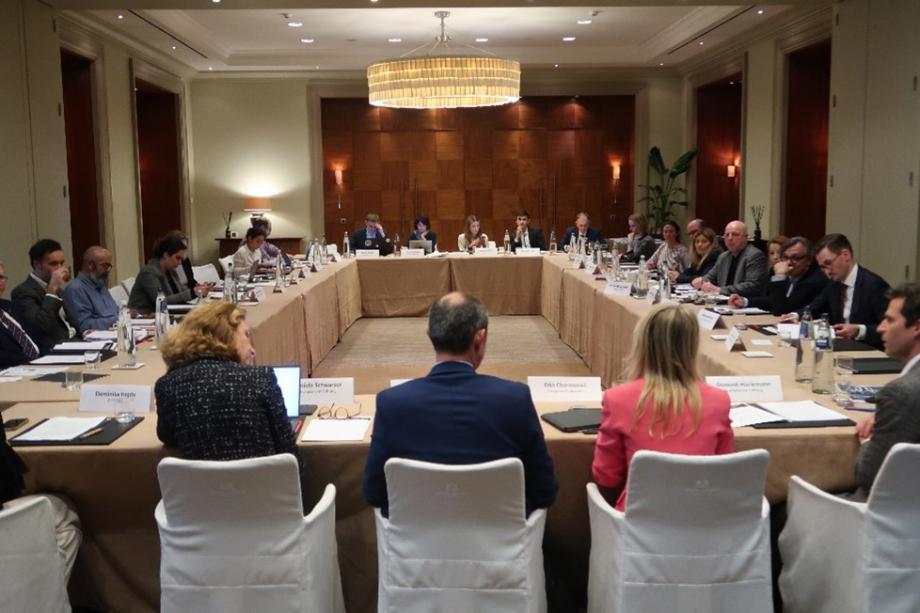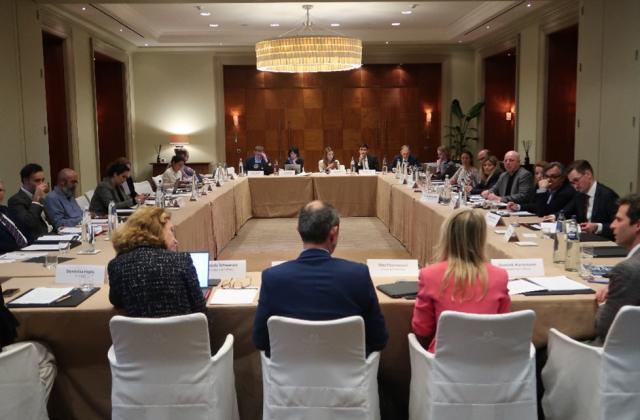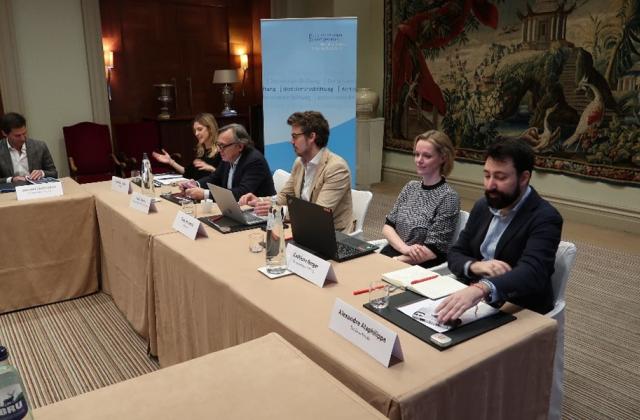From Resilient Information Ecosystem to Resilient Democracy

On April 8, 2024, GLOBSEC, with support from the Bertelsmann Stiftung, organized a workshop focused on addressing the challenges of maintaining a resilient information ecosystem to strengthen democracy. Themed "From resilient information ecosystem to resilient democracy: Key challenges and lessons learned for the next EU Commission, the event gathered approximately 30 experts from journalism, academia, policy-making, industry, and civil society.
These specialists evaluated the EU's regulatory frameworks, particularly the DSA and the AI Act, scrutinizing their implementation since the 2019 elections and discussing enhancements needed for more effective enforcement. Discussions in the initial sessions highlighted the necessity of additional funding for civil society and the idea of creating a "systemic risks fund" to support efforts against disinformation.
Further discussions explored governmental strategies to build resilience against disinformation across the EU, with specific insights from Latvia and Sweden on countering foreign influence operations. Emphasizing a whole-of-society approach, participants argued that disinformation cannot be combated through isolated actions but requires integrated efforts across various sectors. The workshop underscored the importance of continuous improvement in regulatory measures and the engagement of all societal actors to forge a comprehensive and robust defense against disinformation.
This collective reflection and sharing of best practices aimed to formulate strategic recommendations for the next EU Commission, stressing the need for greater transparency, accountability, and collaborative efforts to safeguard democratic integrity.
Observations and key takeaways
Perspectives on EU regulation
- The EU prides itself as an innovative regulatory power that has established reliable frameworks for consultations with civil society, academia, and industry players. Its regulatory measures often include test and trial periods for specific mandates, such as the obligation of very large online platforms to mitigate systemic risks. These get clarified, evaluated, and redefined through guidelines and reporting mechanisms.
- However, when EU regulation spills over to other countries, this usually only happens based on the initial regulation, not the continuous improvement. This creates a Counter-Brussels effect in countries outside the EU, where redress, consultation, and evaluation mechanisms are missing or underdeveloped.
Perspectives on online platforms
- Very large online platforms (VLOPs) take EU regulation – and its potential fines, seriously, at least serious enough to ensure a high presence of public policy staff across events, public, and non-public engagements. There is a sense that social media platforms understand that they need to do better.
- At the same time, understanding the consequences and exploring the boundaries or exploiting the regulatory wiggle rooms are different things. If there is a way to limit the scope of action, bypass obligations or implement them in a way that hinders oversight, platforms will find it. One critical example is the right to data access for research, which may in theory be available, but is in practice severely lacking.
Perspectives on transparency
- The demand for transparency remains unabated over time, despite the establishment of various entities and mechanisms aimed at enhancing transparency in recent years. Ironically, some of these entities dedicated to promoting transparency themselves lack transparency. Consequently, despite advancements, the persisting lack of transparency continues to contribute to power imbalances, particularly concerning information exchange between platforms and other sectors.
- Furthermore, it was emphasised that information transparency also encompasses the way information is presented. For example, the transparency reports issued by platforms are often shared as lengthy PDFs, drowning civil society in hard to process information.
Perspectives on civil society resilience
- There is widespread agreement on the pivotal role of civil society in countering disinformation, underscoring the need for greater efforts to bolster its capabilities, particularly in terms of financial resources. Whether governments or private entities (social media platforms) should bear the financial burden is debatable, with arguments for both emphasising different strengths and interests.
- In addition to that, financial structures that enable building up sustainable organisational structures are considered a key element to ensuring a resilient landscape of civil society organisation in the future.
Perspectives on governments
- While there is no question that governments have a role to play in addressing disinformation, it is imperative that this does not outweigh the whole-of-society approach needed in countering disinformation effectively.
- Continuous evaluation of potential government roles will be essential to minimise the risk of state actions undermining democratic principles and citizen rights. There is a prevailing notion that indirect strategies to counter disinformation, such as bolstering media pluralism, civil society resilience, and democracy through targeted funding, pose minimal risk of harm.
- With a looming Trump re-election scenario, collaboration and partnerships among democratic states of similar mindsets become increasingly pertinent in mitigating disinformation. Prioritising knowledge sharing and cooperation are crucial, alongside fostering a unified vision for strengthening democratic resilience.
Speakers:
Session 1: Setting the Scene: Is the EU Well-Prepared in the Fight Against Disinformation?
- Alexandre Alaphilippe, Founder, EU DisinfoLab
- Cathleen Berger, Senior Expert, Digitalisation and the Common Good, Bertelsmann Stiftung
- Paolo Cesarini, Programme Director, European Digital Media Observatory
- Tjade Stroband, Director European Government Affairs, CELA, Microsoft
- Dominika Hajdu, Policy Director, Center for Democracy & Resilience, GLOBSEC
Session 2: Governmental Approaches Towards a More Resilient Digital Public Sphere
- Rihards Bambals, Head of Strategic Communications, State Chancellery of Latvia
- Charlotte Freihse, Project Manager, Bertelsmann Stiftung
- Mikael Tofvesson, Chief of Operations, Psychological Defence Agency, Sweden
- Katarína Klingová, Senior Research Fellow, Center for Democracy & Resilience, GLOBSEC
Session 3: When the Government Sleeps: Effective non-governmental approaches
- Maia Mazurkiewicz, Head of StratCom, Alliance4Europe
- Jochen Spangenberg, Dissemination Manager, Vera.AI and Research and Cooperation Projects, Deutsche Welle
- Cecilia Zappalà, Head of EU Government Affairs and Public Policy, YouTube
- Dominika Hajdu, Policy Director, Center for Democracy & Resilience, GLOBSEC
Session 4: Challenges and Opportunities of Today: What’s next for the EU Commission?
- Dita Charanzová, Vice President, European Parliament
- Daniela Schwarzer, Member of the Executive Board, Bertelsmann Stiftung
- Lutz Güllner, Head of Strategic Communications, EEAS
- Dominika Hajdu, Policy Director, Center for Democracy & Resilience, GLOBSEC
- Dominik Hierlemann, Senior Advisor, Bertelsmann Stiftung
The event summary was originally published by the Bertelsmann Stiftung here.

